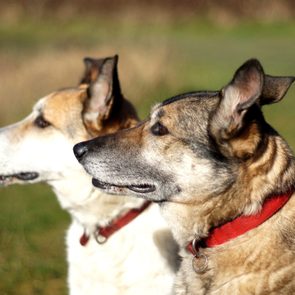If the furry love of your life is treating your fingers like a chew toy, follow these expert tips to get your puppy to stop biting

How to Stop a Puppy from Biting, According to Dog Trainers

Your brand-new puppy may have the sweetest little face you’ve ever seen, but he also has a full set of razor-sharp baby teeth. While you might tolerate the nipping at first and even think it’s kind of cute, let’s be honest—it hurts. It also becomes more of a problem the longer it goes on and the bigger your dog gets, especially if you have a large-breed dog. But we have some good news: This is only a phase … as long as you know how to stop a puppy from biting.
Don’t worry, you don’t have to be a pro pet trainer to get great results. Reader’s Digest turned to four experts—veterinarians, dog trainers and animal welfare authorities—for the answers to your most pressing questions. Read on to learn how to stop a puppy from biting so you can eliminate the bad behavior and get back to enjoying your new fur baby.
Get Reader’s Digest’s Read Up newsletter for more dog behavior, humor, cleaning, tech and fun facts all week long.
Why do puppies bite?
Puppies are curious little explorers, and for them, the world is best understood through their mouths. This means that everything they come in contact with, including human fingers and toes, is fair game for a nibble. They are also exuberant and full of energy. These two typical puppy traits often translate into rough play and biting behavior.
This does not mean you have a vicious-dog-in-training on your hands. Unless your dog has had bad experiences and is fearful of people or their environment, they’re not biting out of self-defense or trying to hurt anyone. Biting just means you have a normal puppy who loves to do normal puppy stuff.
Mastering how to stop a puppy from biting has everything to do with you and what you teach them is acceptable. Letting your puppy bite you during play (or ever) is a puppy-training mistake you might regret later.
Is puppy biting just a phase?
Absolutely! Just like human babies, puppies go through a teething phase. And just like babies, they try to soothe their irritated, painful gums by chewing on anything they can fit into their mouths. “Puppy biting is universal,” says Ali Mason, DVM, a veterinarian and the regional doctor mentor at Thrive Pet Healthcare. “All puppies bite, simply due to teething. The most aggressive teething phase for puppies is between 2 and 6 months old.”
Where puppies and human babies should differ is in your response to their teething behavior. According to Dr. Mason, you can’t stop teething from happening, but you can teach your pup not to chomp on you. The trick? Treat teething nibbles like playful biting: with calm, consistent training. Your fingers will thank you.
How do you stop a puppy from biting?
Ready to save your favorite shoes from the cutest creature to ever destroy very expensive leather? Ahead, the experts spill their best secrets for how to stop a puppy from biting everything.
Arm yourself with puppy toys

Rule No. 1: Give puppies things to chew that have your approval. If they don’t have their own toys, it will be harder to wean them off your shoes and fingers.
“Chewing is a natural behavior for a dog, and it’s important to provide puppies with safe ways to chew, to help satiate that behavior,” says dog-training expert Erin Askeland, the senior manager of program development at Camp Bow Wow. “Options may include safe bones, rubber items like Kongs and stuffed toys designed for puppies. If they don’t have access to these items, puppies will find other things to chew and bite on.”
Simply having an arsenal of chew toys lying around isn’t quite enough. To really teach your pup what’s OK to chew on, you’ve got to be a little more hands-on. “Always swap out what they shouldn’t be chewing on for an approved toy,” says veterinarian Gary Weitzman, DVM, the president and CEO of the San Diego Humane Society. “Puppies spend three to five hours a day chewing, so it’s incredibly important to leave appropriate items around the house for them to pick up and chew.”
He also suggests praising your puppy for chewing on appropriate items.
Act like you’re injured
Here’s a smart trick to help stop your puppy from biting: Veterinarian Jennifer Coates, DVM, recommends mimicking how another dog would respond to a too-hard nip. “Shriek as if you are truly injured, walk away and ignore your puppy,” she says. “Go into a separate room and close the door if you have to. After a few minutes, you can play with your puppy again, but pick a game or toy that is unlikely to result in biting. Fetch is a good example.”
If you follow this method, will the biting stop altogether? Dr. Coates says that if you consistently end playtime every time your puppy puts his mouth on a person, the behavior should disappear fairly quickly. If it doesn’t, consult your veterinarian or a qualified behaviorist or trainer. This response should train your puppy that human skin is off-limits and that nipping at you will not get him what he wants the most: your love and attention.
Introduce them to other dogs
When puppies are born, their littermates function as their first playmates. And it’s in this setting that puppies start to figure out what’s too rough. If a puppy bites too hard during playtime, the other dog yelps or walks away. This is how puppies learn to stop biting early on. Not every puppy has this opportunity, though. Some are separated from their mothers and littermates too soon, robbing them of the ability to experience early socialization and learning.
Whether or not your puppy was weaned too early, interaction with other puppies and adult dogs can still teach this important lesson.
“Puppies can learn from other dogs how to soften their bite for appropriate play. This is called bite inhibition,” explains Askeland. “It’s critical for puppies to learn to socialize with other dogs in order for them to learn bite inhibition. Another dog may respond to a puppy’s too-hard bite by biting back, refusing to play or running away. These responses are typically not desired by the puppy, so the puppy can learn that too hard of a bite causes him to lose the play and attention from the other dog.”
The trick? Supervised puppy play dates. Just dropping your dog’s leash and telling him to go play is a common dog-owner mistake, but it’s easy to avoid.
What should you not do when your puppy bites?
In addition to learning the do’s of how to stop your puppy from biting, it’s also important to know the don’ts. Some common methods might seem like quick fixes, but they can actually backfire. According to Dr. Mason, the following methods will not work—and may even make your puppy fearful and aggressive.
- Don’t hold your puppy’s mouth shut.
- Do not yell at your puppy.
- Do not punish your puppy with touch in any way.
- Don’t use negative reinforcement to stop your puppy from biting.
The bottom line? Skip the scare tactics. Gentle, consistent training builds trust, and that’s what really works in the long run.
Will your puppy eventually outgrow biting?
Puppy biting might be frustrating, but remember that it’s totally normal and will resolve itself quickly if you are consistent in your training. Keep playing with your puppy, as these interactions will help to establish a loving bond between you. But if your furry little friend seems to be biting out of fear or anger, invest in a qualified dog trainer. Just a few sessions are often enough to stave off possible behavior issues so that your life together is one big treat.
About the experts
|
Why trust us
At Reader’s Digest, we’re committed to producing high-quality content by writers with expertise and experience in their field in consultation with relevant, qualified experts. We rely on reputable primary sources, including government and professional organizations and academic institutions as well as our writers’ personal experiences where appropriate. We verify all facts and data, back them with credible sourcing and revisit them over time to ensure they remain accurate and up to date. Read more about our team, our contributors and our editorial policies.
Sources:
- Ali Mason, DVM, veterinarian and regional doctor mentor at Thrive Pet Healthcare
- Erin Askeland, senior manager of program development at Camp Bow Wow and member of the board of directors for the Certification Council for Professional Dog Trainers
- Gary Weitzman, DVM, MPH, CAWA, veterinarian, president and CEO of the San Diego Humane Society and author of nine books, including Everything Dogs and How to Speak Dog
- Jennifer Coates, DVM, veterinarian, consultant and author of several books related to veterinary medicine, including Dictionary of Veterinary Terms: Vet-Speak Deciphered for the Non-Veterinarian























